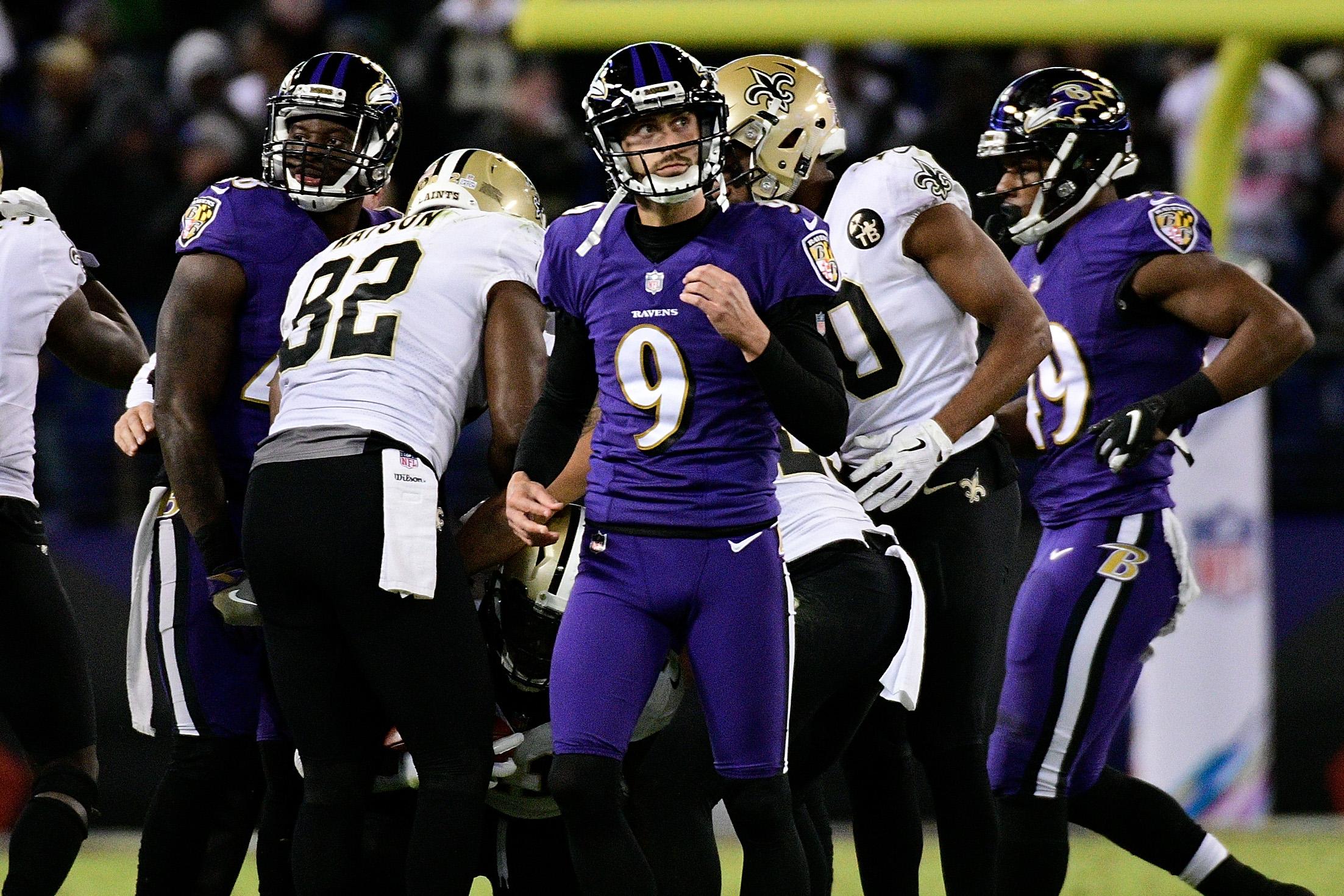
The last few years of NFL football have been packed with innovation. Run-pass options became the play du jour last season, but it doesn’t stop there. College concepts, spread schemes, and advanced analytics are changing football as we know it. But while most of the league’s recent innovations have helped create an explosion on offense—and thus, helped teams win football games—Week 7 showcased how NFL squads are finding newer, more modern ways to lose.
This week, we had losses come as a result of a missed two-point attempt, a missed extra point, a missed field goal, a disastrous fourth quarter, and more. It was weird (and the Giants and Falcons don’t even play until Monday night!). Here’s a rundown of all the ways teams taught us to lose in Week 7:
Extra Points Aren’t Automatic: Ravens 23, Saints 24
Justin Tucker is the NFL’s best kicker. He came into Sunday with 214 career field goals made, which is the most in the league since he entered the NFL in 2012. He’s made 89.9 percent of his field goals in that span, which is third among players with at least 100 attempts, and he’s made a league-leading 36 kicks of 50 or more yards in those six and a half seasons. He dreams of hitting a 70-yarder. He’s made two All-Pro teams, and, after two extra-point kicks on Sunday against the Saints, had made 222 in a row—he’d never missed even a single one in his entire career.
Tucker’s reliability made it seem like a no-brainer that Ravens-Saints would go into overtime after the Baltimore offense drove down the field in the final two minutes and Joe Flacco tossed a touchdown to John Brown with just 24 seconds left on the clock. That TD made the score 23-24, and an extra point is often just a formality for most NFL kickers—even since the NFL moved the kicks back to the 15-yard line in 2015. For Tucker, they seem like a pointless ritual. Then this happened:
Extra points are more automatic to Tucker than anything I do in my life. I’m pretty sure I wouldn’t be able to correctly pull my car out of the driveway 222 times in a row. I probably can’t spell my name right 222 times in a row. Last week I tried to make a peanut-butter-and-jelly sandwich and I dropped one half of it, jelly side down. Even the simplest, most routine tasks have a chance of failure, but for six and a half seasons, Tucker had been perfect. So it’s understandable that when he missed that kick, he looked like a kid who’d just found out that Santa Claus isn’t real. It’s like the fabric of his reality had been torn in two.
As far as ways to lose a game go, missing an extra point in the final seconds will always be confounding and—depending on your rooting interests—hilarious. But when that missed kick comes from Justin Tucker, it enters a whole other dimension of WTF.
Right Decision, Wrong Call: Titans 19, Chargers 20
As the seconds ticked away near the end of the Titans-Chargers game in London, Marcus Mariota and the Tennessee offense put together a masterful drive to move the ball 89 yards in 13 plays, finally scoring a touchdown when Mariota found tight end Luke Stocker on a 1-yard pass. That made the score 19-20 with 31 seconds left, and Titans head coach Mike Vrabel, who has a history of playing to avoid ties, decided the Titans should go for the two-point conversion rather than kick a game-tying PAT. A conversion would give the Titans a one-point lead and an almost certain victory, given how little time was left on the clock. A failure would mean that the Titans would instantly lose (outside of a miracle onside kick recovery). The Titans didn’t get it. They lost.
The decision to go for two was hyperaggressive, especially for the historically risk-averse NFL, but it was the correct move. The Titans were 6.5-point underdogs, so a chance to win the game on one play serves them better than an extended overtime in which there will be more chances for the better team—the Chargers—to secure the victory. If a coach thinks he has a better than 50-50 shot, going for two is the right decision, and the leaguewide conversion rate usually hovers around 50 percent. With a mobile QB like Mariota, the Titans had multiple ways to score; they easily could have had a high chance of converting with the right play call. And that’s where the problem lies. Here’s the play that the Titans ran:
Historically, run plays are better than pass plays for any two-point conversion, because running backs will find success just under 60 percent of the time. But if a team is set on passing, it should at least put a running back in the backfield to keep the defense on its toes. The Titans didn’t do that — they sent Dion Lewis in motion, but their play design telegraphed a pass from the beginning. That’d be disappointing for any two-point conversion play call, but it’s even more egregious because of a Chargers holding penalty on the play before, which put the ball on the 1-yard line, not the 2. And the best way to get 1 yard in the NFL is to just do what’s obvious: a QB sneak.
Instead, the Titans ran an uninspired slant route intended for Taywan Taylor. If they aren’t going to QB sneak or commit to a different kind of rush, this is the area of the field where offensive coaching staffs need to get creative and make use of all the horizontal space available when the vertical space is so limited. Vrabel, didn’t you learn anything from Philly Philly?
No, Mitch, Hail Marys Need Go Into the End Zone: Bears 31, Patriots 38
This was Bears receiver Kevin White’s second reception of the season:
Completed Hail Marys are basically pure luck. This isn’t Julio Jones, or Odell Beckham Jr., or DeAndre Hopkins making this play, and it isn’t Aaron Rodgers or Drew Brees or Patrick Mahomes II making the throw. It’s a struggling second-year QB throwing generally in the direction of the end zone, and an oft-injured, now mostly irrelevant third-year wideout just happening to be in the right spot to catch it. There is no real rhyme or reason for which Hail Marys are completed and which are not—you can’t convince me that there’s a special science to how these plays work. That’s why we call them Hail Marys—they’re prayers.
That said, maybe Mitchell Trubisky wants to put his next Hail Mary attempt in the end zone? Just a thought.
Doink: Cowboys 17, Redskins 20
Washington nearly put on a clinic in how to lose, as they led by 10 points with under two minutes remaining and came close to choking the game away. But the Cowboys beat them to it. After Dak Prescott scored on a 1-yard run to make the game 20-17, their defense forced a three-and-out and got the ball back with 1:09 left. The Dallas offense drove 36 yards and lined up for a 47-yard field goal, which is well within rookie kicker Brett Maher’s range. Then Cowboys long snapper L.P. Ladouceur got called for a (questionable) false-start penalty that pushed the kick back 5 yards. It was his first penalty since 2015.
That made it a 52-yard attempt for Maher, which is still makeable—he came into today 3-for-3 on 50-plus-yard kicks this season. But given that this is a piece about losing, well, just listen to the sound this makes:
A missed 52-yard field goal would be forgivable, but this kick didn’t have to be so hard. Beyond the holding penalty, the Cowboys played as conservative as possible in the final minute of the game. Dallas already had the ball at Washington’s 46 with 52 seconds left in the game and a timeout remaining—plenty of time to set up a chip-shot field goal. Prescott completed a couple of short passes to Cole Beasley, and then, with 12 seconds remaining, the Cowboys ran the ball for 2 yards. They could have taken some shots to give their kicker an easier chance—like Aaron Rodgers did last Monday night. Instead, they settled for a much tougher kick than they needed to, and they lost because of it.
Maybe Don’t Give Up Three Touchdowns in the Fourth: Eagles 17, Panthers 21
The Eagles were up 17-0 entering the fourth quarter, so it looked like they had the Panthers in hand. Here’s how the next three Carolina drives went:
- 11 plays, 80 yards, touchdown (began in the third quarter)
- 7 plays, 87 yards, touchdown
- 10 plays, 69 yards, touchdown
And here’s how the Eagles did:
- 6 plays, 22 yards, punt
- 3 plays, zero yards, punt
- 4 plays, 48 yards, fumble
This is just a classic collapse. The Eagles had a greater-than 97 percent chance to win this game in the third quarter, per NumberFire, indicating that just about everything had to go wrong for them to lose. And everything went wrong. Philly even was gifted the ball after an Eric Reid interception was overturned upon review—but it really doesn’t seem to me like the ball hit the ground. Take a look:
Three plays after that, the ball was on the Carolina 14-yard line. Facing a fourth-and-2 with 31 seconds left and needing a touchdown to take the lead, Carson Wentz was strip-sacked by Julius Peppers. I guess it’s true: The ball don’t lie.
When Both Teams Seem to Want to Lose: Browns 23, Buccaneers 26
If we ran this column every week, we’d just pencil the Browns in at this point. Cleveland has played in four overtime games in seven contests, and it had a fifth that was tied in the fourth quarter. The Bucs, though, gave the Browns a run for their money in terms of who could lose this game.
Almost everything about the final few minutes in Browns-Bucs was inexplicable. Tampa Bay allowed the Browns to return a punt 32 yards with under three minutes left, Baker Mayfield threw a 16-yard touchdown pass on the very next play, and after the extra point, the game was tied. Then the Bucs missed a 40-yard field goal as time expired.
In overtime, the Browns and Bucs punted a combined three times, Tampa Bay QB Jameis Winston threw an interception, and Cleveland returner Jabrill Peppers fumbled on a punt. With under two minutes left in overtime, we were, for the millionth time this season, on Browns Tie Watch. It was like no one wanted the victory! Then Bucs kicker Chandler Catanzaro—who had missed just minutes before—hit a 59-yard field goal, and we got this:
At 2-4-1, the Browns are having a tough season. They easily could have a much better record. But at least they’re giving us memes.
Derek Anderson Is Still in the NFL?: Bills 5, Colts 37
Not all interesting losses have to come in the final few minutes. Sometimes, a team starts its third-string quarterback and he throws three interceptions and the team scores five points. Buffalo has an injured bad quarterback and two healthy bad quarterbacks, which would be mean of me to point out, but they did this to themselves.

